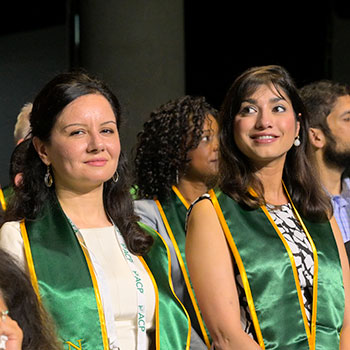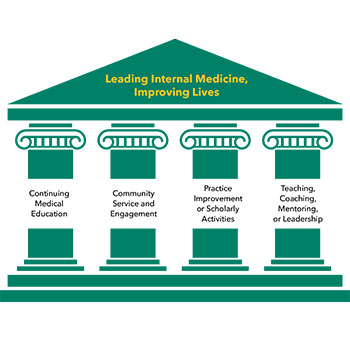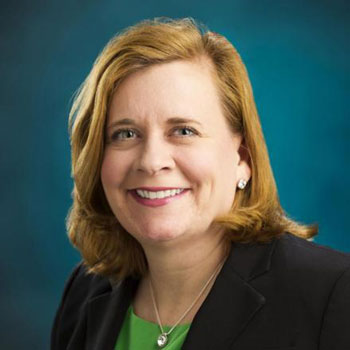Are you ready to be an FACP?
Becoming an FACP is a rite of passage for many early career ACP members.
Out of all the decisions Richard M. Wardrop III, MD, PhD, FACP, made in his early career, getting engaged with ACP was one of the best. “Fellowship was a big part of it,” he said. “You come for the science and stay for the people.”
Becoming an FACP is a rite of passage for many early career ACP members. The credential is a strong addition to your CV, shows professionalism, and can lead to future leadership opportunities at the College and beyond.

“I have really been impressed with how valuable the FACP mark is as a part of my career,” said Thomas H. Gallagher, MD, MACP. “It's something that I hope every member of the College (and internal medicine physicians who aren't members) think about and aspire to, because it's not only an important mark of professional distinction for your colleagues and something that patients really like, but it's also a commitment to the values of the College.”
For Dr. Wardrop, who is program director of the internal medicine residency at Cleveland Clinic, becoming an FACP solidified that commitment to ACP as his professional home. “I saw ACP as a place where patient advocacy and political action could take place, and I never had seen it that way before,” he said.
Now, recent changes streamline the process of becoming an FACP. Several changes to the Fellowship criteria were approved in July by the Board of Regents and recently went into effect.
“What we were trying to achieve with the changes, in part, was to make the FACP process more accessible, especially to nonacademic physicians,” said Dr. Gallagher, Vice Chair of ACP's Credentials Committee, which approves Fellowship candidates. “We really wanted to make sure that community physicians or physicians who are working in administrative roles saw FACP as something that was attainable for them.”
Pathways to fellowship
While most physicians become FACPs through the Advancement to Fellowship track, the Guided Fellowship Program offers a pathway to achieve Fellowship at three years post-residency. After completing residency, current ACP members who were dues-paid Resident/Fellow Members during the previous membership year are eligible to enroll in the program, which is currently waiving the $175 one-time enrollment fee for guided fellowship.
The Guided Fellowship Program is popular among early career physicians because it produces quick returns and eliminates certain barriers, such as letters of recommendation, said Saba Hasan, MD, MACP, an ACP Regent, Chair of the Credentials Committee, and Past Governor for the New Jersey Chapter. The proportion of Fellows designated through this track has grown from 18.6% during its inception in 2020-2021 to 24.4% in 2022-2023.

One of the biggest recent changes to the Fellowship program is the introduction of the Pillars of Fellowship framework. Four pillars now represent categories of activities that support the College's overall mission of leading internal medicine and improving lives: continuing medical education; community engagement or community service; practice improvement or scholarly activities; and teaching, coaching, mentoring, or leadership.
The pillars replace the previous activity points-based system, which had required applicants to earn points in at least three of six professional domains (teaching, leadership, community engagement, ACP activities, scholarly activities, and professional development). The new framework underscores both the Guided Fellowship Program and Advancement to Fellowship.
For the Advancement to Fellowship track, the new framework asks applicants to attest to activities in three of the four pillars, rather than listing out all their different activities, Dr. Gallagher noted. And while the Guided Fellowship Program previously required participants to accumulate 100 points across 20 different activities, “That's been greatly simplified, where instead we're asking participants to attest to activity in one of the three pillars per year and three of the four pillars by the end of the Guided Fellowship Program,” he said.
One other change to the Advancement to Fellowship Program that will be meaningful, especially for physicians in nonacademic and rural settings, is the reduced requirement of one versus two letters of recommendation, said Dr. Gallagher, who is a professor of medicine and bioethics and humanities and associate chair of the department of medicine at the University of Washington School of Medicine in Seattle.
“For physicians who practice in an academic environment, letters of recommendation are much more straightforward to come by. … That was a barrier for some folks, and as we thought about the application process, we thought that one robust and meaningful letter of recommendation from an FACP or MACP would really suffice,” he said.
This change, as well as adding more examples of qualifying activities for nonacademic physicians, will remove the academic bias from the application process and help more members achieve Fellowship, said Dr. Hasan, who is also program director for the internal medicine residency and the associate designated institutional official for Capital Health in Trenton, N.J. “When I talk to people, it seems like they feel like Fellowship is only for this very savvy academician, and those in full-time clinical practice or administrative roles feel like they don't qualify for it,” she said.
The new changes came on the heels of another important change to Fellowship eligibility, which was implemented after receiving Board of Regents approval in 2021. The Board amended the dues payment requirement for Fellowship eligibility from three consecutive years of the most recent dues payments to three out of the past four years.
The COVID-19 pandemic precipitated the easing of this requirement, said Dr. Hasan. “There were a number of situations where people forgot that they have to pay their ACP dues, and the Governors brought those to our attention,” she said. “And then the Board also charged us to look at the criteria and see how we can streamline the process.”
Research done through ACP's Credentials Committee and Research Center informed the changes, said Dr. Gallagher. “ACP staff did a great job of surveying two groups of folks, a group who were eligible for FACP but weren't currently fellows, as well as a group of folks who have recently been through the FACP process,” he said.
While the results showed that both groups see the value in Fellowship, they also suggested that for some, being a busy physician was a barrier to applying, said Dr. Gallagher. “There were opportunities for streamlining the application process in a way that would make FACP feel more attainable,” he said. “We think these changes will really help physicians who recognize the value of FACP but have been held back in terms of figuring out how to get through the application process.”
Launching your career
One of the biggest challenges to more people applying for Fellowship is a limited understanding of the designation's value, Dr. Hasan said.
Since FACPs receive many of the same ACP benefits as regular members, some may not immediately perceive the additional impact that Fellowship makes, she noted. “You get many of the same benefits, but at the same time, you get to grow in a leadership role within the College,” said Dr. Hasan. (Daisy Smith, MD, FACP, ACP's Chief Membership and Engagement Officer, added that ACP is in the process of creating a more “velvet rope” experience for FACPs.)
Growing in that role provides leadership experience at the national level, which could include becoming a Chapter Governor, sitting on an ACP Committee, or even becoming a Regent, Dr. Hasan said. “I think all that is really important on your CV, regardless of whether you're an academic or a nonacademic, because your employer looks at it and says, ‘Oh wow, Jane Smith is recognized as a leader in an organization of 160,000 members,’” said Dr. Hasan, adding that she is pleased to see that the average age of ACP Governors is decreasing.
Dr. Wardrop was one of those younger Governors—he served as Governor-elect for the North Carolina Chapter starting in 2019 before moving out of state—but said becoming an FACP as an early career physician in 2009 launched his leadership path within the College, which has also included roles as an inaugural Well-being Champion, inaugural Physician Well-being and Professional Fulfillment Committee member, Chair of the Council of Early Career Physicians, and membership on the Board of Governors and Board of Regents.
“Being designated as a Fellow really solidified my commitment to ACP and certainly has been a part of my professional journey and my professional livelihood,” said Dr. Wardrop, who is also a hospitalist and vice chair of the academic department of medicine at Cleveland Clinic.
He added that even though he counsels residents about the value of finding a professional home with ACP through Fellowship, being an FACP isn't rooted in his academic identity as a program director or professor. “I never felt that it was tied to that,” he said. “I thought it was really tied to the engagement with the commitment part more than anything, and in aligning with the College's values.”
One additional benefit of attaining Fellowship is being invited to participate in Convocation, an annual ceremony where ACP recognizes new FACPs and the recipients of various honors. More than 375 new Fellows were recognized at this year's ceremony, held in April at Internal Medicine Meeting 2023 in San Diego.
Even though he's participated in several graduation ceremonies, Dr. Wardrop said he felt compelled to attend the optional event when he became a Fellow and revel in the honors. “The way that they do it, there is pageantry, and it was provocative emotionally for me to be a part of that,” he said. “And when I went through it on the other side—I think I've done it two to three times as a College leader or Governor-elect—it was inspiring to be there for other people and to see them celebrate.”
But for some, becoming an FACP is not the end of the road for ACP honors. Highly accomplished Fellows may be awarded Mastership, as Dr. Gallagher was in 2019 and Dr. Hasan was in 2021. “The process doesn't end when you're an FACP, and that next step is something to think about,” Dr. Gallagher said.
While Dr. Wardrop has thought about becoming an MACP, he is also aware that it's a high distinction that will take a lot of service to achieve. “That would be a dream come true, in a way that I probably can't even describe without getting a little bit choked up,” he said.




